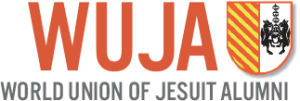12/11/2016
The Society of Jesus: With a new Captain, and “Rowing into the Deep”
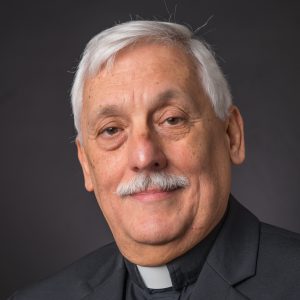
The timing might be seen as a coincidence: the 36th General Congregation has come to an end on the very day of the 68th birthday of the one that has been elected as new Superior General. For WUJA this is a great opportunity to welcome Father Sosa in his new function and to introduce him in a more detailed way to the alumni from all over the world.
“It is enough to look at the group photography of the Congregation to see its immense cultural variety; we have people of more than one-hundred countries seated around the same table, each one having his own cultural background. There is also a common culture, and that common culture has to do with the experience of the Spiritual Exercises and that of discernment. There is a big training and a great desire to listen to the same voice, which is the Voice of the Spirit, and I think that that is what we have been working on during these past days.”
Those were the words of who at the time (October 7th 2016) was the Delegate for the International Roman Houses of the Society of Jesus, Arturo Sosa, in a remark used as the basis of a short official video on Cultural Diversity and Unity inside the General Congregation, not knowing that less than a week later, he would become the “Man in Charge” of that culturally diverse group of more than 16.500 people, spread, but united, worldwide.
Back then, Sosa did not know that on October 14th with these words, Father Patrick Mulemi, Director of Communications and PR of the Society of Jesus, announced him to the public as the 31st Superior General in the Society’s 476-year history: “This morning, after four days of prayer and reflection, the Society of Jesus has elected Father Arturo Sosa, from Venezuela, as our new Superior General.”
Father Sosa was now the leader of the 16,740 Jesuits around the world. (12,000 priests; 1,300 brothers; 2,700 scholastics; and 753 novices), and the first non-European to take on what, for many, is considered as the second most important position in the Catholic hierarchy only being exceeded by the one of Pope. This all happening within the framework of the 36th general Congregation of the Society of Jesus, held in Rome, between October and November 2016.
The 36th Congregation: a calling to “Row to the Deep”
During one of his last addresses as Father General, Adolfo Nicolas SJ, expressed his expectation about the 36th General Congregation, saying that: “times have changed, and the Society of Jesus is more aware that we are in need of bravery, imagination and courage to face our mission as part of the greater Mission of God towards our world.”
That is precisely why, by the words of the exhortation made by pope Francis to the members of the Society of Jesus in the framework of the 200th anniversary of its restauration in 2014, in which he invited the Jesuits to discern in the middle of difficult times, to be docile and obedient to the Will of God, and to “row together at the service of the Church”, and the invitation of Pope Benedict during his last allocution to the 35th General Congregation to “Go to the Frontiers”, the Society of Jesus has adopted as the general motto of their 36th General Congregation, the phrase: ”Rowing into the deep”, which basically is a four word briefing of the challenge that obeying to their Fourth Vow (that of obedience to the Pope) implies.
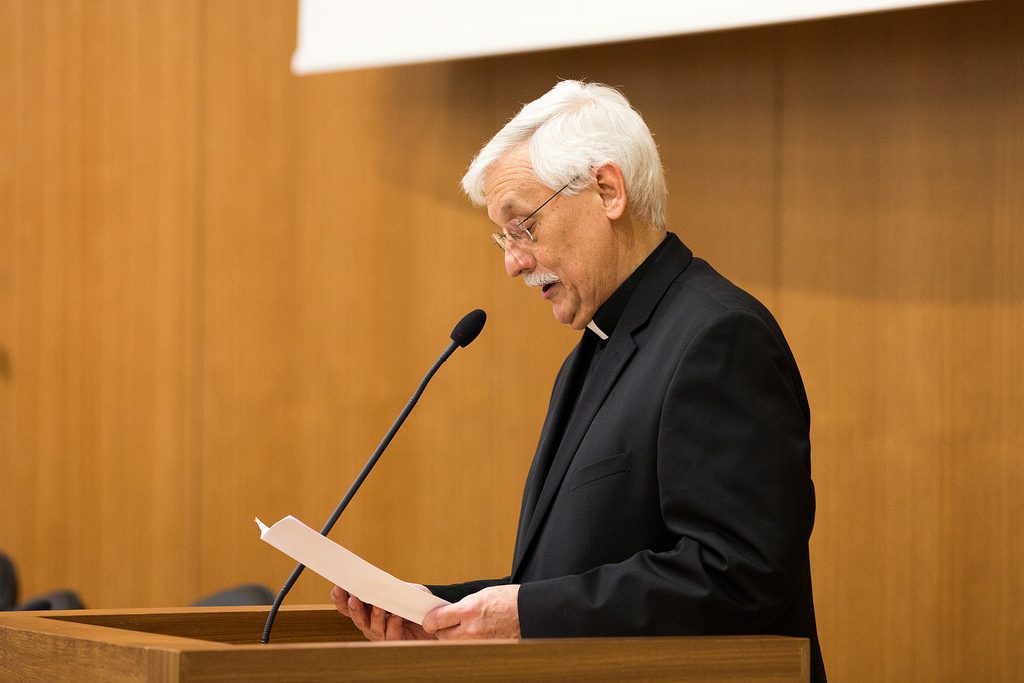
From: www.gc36.org
In his first press conference as Superior General, Father Arturo Sosa SJ, explained his position on this primary goal established by the Society of Jesus facing the needs of the world today: “I think it is very in the heart of the Society of Jesus that link to the Pope, and the reason is we are not able to choose which are the priorities of the Church. If you are in any location, your temptation is to think that the most important thing is to work there, but there is somebody in the Church that has an overview and can say: ´No! that is very important, but I need you in that other work or that other part of the world´ So that is the idea, the idea is to be an organization that can help the Church, When, Where, and doing What the Church Needs. And who is going to determine what are the needs of the Church? The Pope! The Pope, because his function in the Church is that; the Pope as you know is the Bishop of Rome, but that is title, but his function is to put together and to take care of the whole Church, so, the Society of Jesus has an obedience to the Pope, to better serve the Church and humanity,”
The Holy Father detailed three areas of the Society’s path:
- The first is to “ask insistently for consolation.” It is proper to the Society to know how to console, to bring consolation and real joy; the Jesuits must put themselves at the service of joy, for the Good News cannot be announced in sadness.
- Next, Francis invites us to “allow ourselves to be moved by the Lord on the cross.” The Jesuits must get close to the vast majority of men and women who suffer, and, in this context, it must offer various services of mercy in various forms. The Pope underlined certain elements that he had already had the occasion to present throughout the jubilee year of Mercy. We who have been touched by mercy must feel ourselves sent to present this same mercy and, he added, in an effective way.
- Finally, the Holy Father invites us to go forward under the influence of the “good spirit.” This implies always discerning, which is more than simply reflecting, how to act in communion with the Church. The Jesuits must be not “clerical” but “ecclesial.” They are “men for others” who live in the midst of all peoples, trying to touch the heart of each person, contributing in this way to establishing a Church in which all have their place, in which the Gospel is inculturated, and in which each culture is evangelized.
These three last words of the Pope’s speech are graces for which each Jesuit and the whole Society must always ask: consolation, compassion, and discernment.
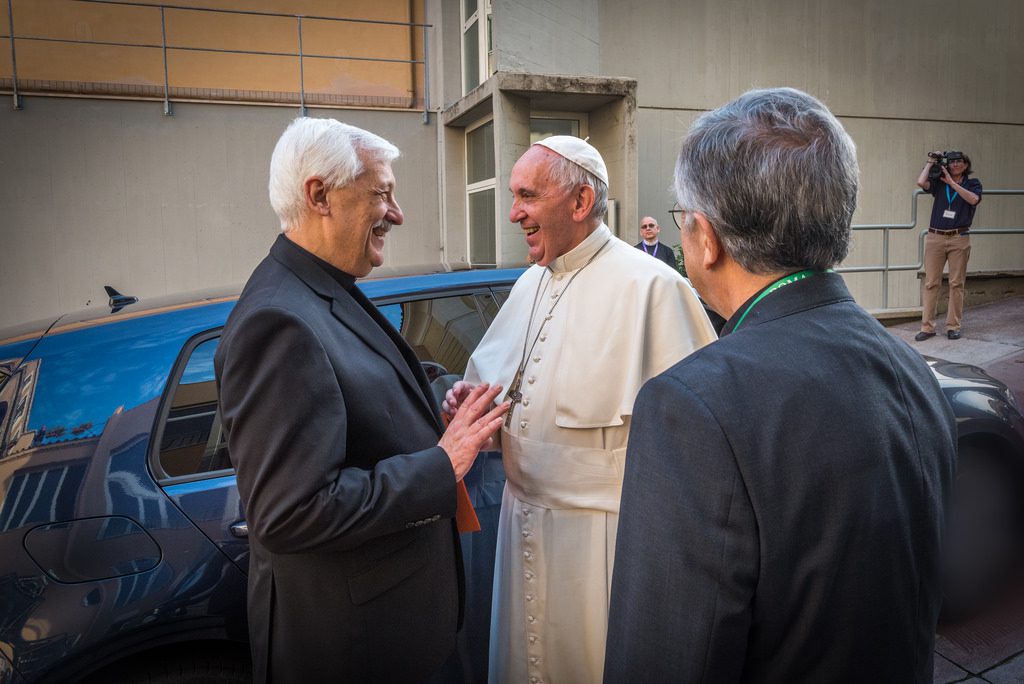
From: www.gc36.org
Having elected their Superior, the Delegates gathered around topics of importance, and all correlated to the call of “Rowing into the Deep”, including the mission of the Society and the structure of the order, as well as the working life of the Jesuits, and other points established in prior Congregations, such as the establishment of being at “service to faith and the promotion of justice” as the main characteristic of the Jesuit’s task, established during the 32nd General Congregation, back in 1974.
Choosing of a Superior General: the right “Captain to lead the way”
In a special report on the election of the Father General made by Austen Ivereigh for the Catholic news, Crux, from many different conversations with Jesuits young and old in college residences in Colombia, Ecuador and Venezuela, the new General should be:
- Capable of at least keeping up with Pope Francis, who, they believe, is setting a pace and objectives that have effectively moved the frontier to Rome;
- A man of governance, able to manage the structural implications of a fast-shrinking body in Europe and a fast-growing one in Asia and Africa, enabling the Society worldwide to better cohere;
- An advocate of the social apostolate, a visionary capable of inspiring and articulating the worldwide Jesuit commitment to the poor, ecology, and human diversity, as did Pedro Arrupe, the General who steered the Society through the post-Vatican II renewal;
- Not too old (not over 70), because retiring after less than 10 years sits oddly with St. Ignatius of Loyola’s insistence that Generals be elected for life; and not least
- A Latin American, because it was time that the Society’s leadership reflected the southward gravitational shift in both the order and the wider Church, but not yet time for Asia and Africa, whose Jesuits often lacked knowledge of the universal Church.
This thinking not only was the reflection of the thoughts of the focus group led by Ivereigh, but, during the research stage for this article, the editorial team of WUJA found out that it was also shared by a dense group of Jesuits, and one might ask to think of it as the one of a general majority of the members of the Society.
How did the election process take place?
The election process of the person who was going to become their leader, was taken with the deserved importance by the 212 Jesuits with the voting power, who attached themselves to the protocolary established steps for the election of the XXXI Præpositus Generalis (Official name of the position of the Father General). As Father Orlando Torres, Rector of the Jesuit Studies House in Rome, puts it, the process is unique to the Jesuit tradition: “if you have not seen it, you would think it is impossible…I’ve never seen an election like this anywhere in the world”.
The steps of the voting process are:
Four days of “Murmuratio”: Centuries-old practice of one-on-one conversation and information gathering, accordingly to the needs foreseen during the General Congregation. There cannot be group conversations, and no proposing of candidates to fellow voters.
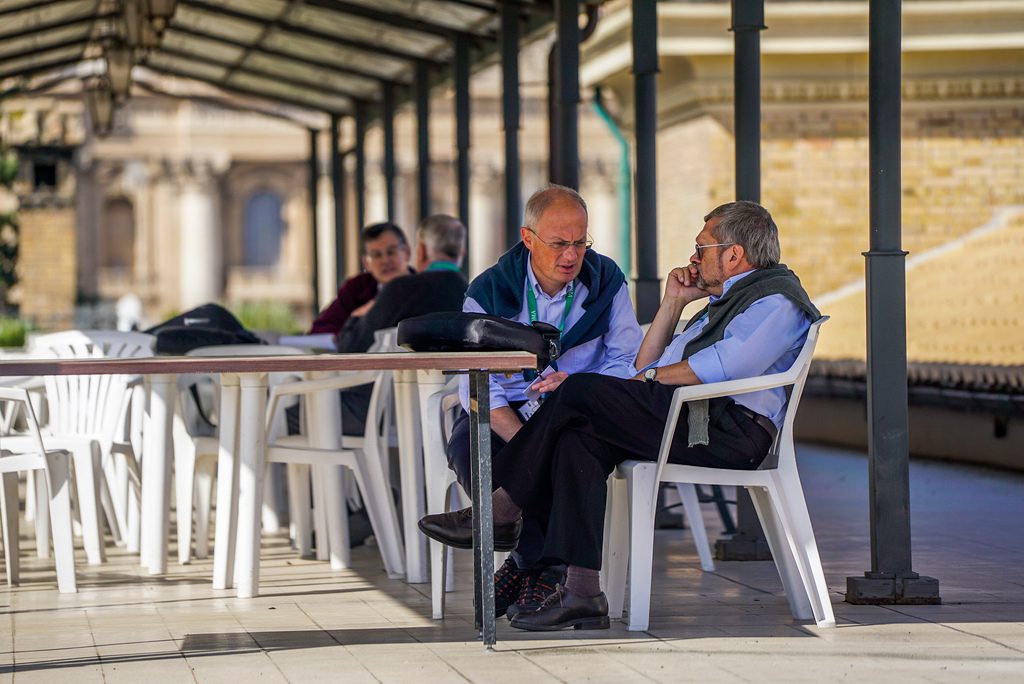
From: www.gc36.org
The day of the election:
- “Votive Mass of the Holy Spirit”: Intended to ask the presence and guidance of the Holy Spirit within the group of voters, therefore it was celebrated at Santo Spirito (Holy Spirit) Church with a homily by Father James Grummer, SJ, Vicar General of the Congregation.
Some of Father Grummer´s thoughts on the role of the voters and the importance of the Holy Spiritual presence in the voting process during his admonition:
“Our mission this morning is to elect a General. We will be locked into an upper room, not for fear but for concentrated listening to the Spirit’s whisper. We are not afraid because we believe so strongly that the Spirit guides the balloting that, according to Formula 84, ‘The man elected cannot refuse the election’.”
“Even if I need batteries in my spiritual hearing aid, I can trust that through this band of brothers the Spirit will identify the man he has chosen. We can trust that Jesus will give us his Spirit, no matter how locked we may feel.”
“I believe Ignatius said so little about the Holy Spirit because he did not want words to distract doubters and Inquisitors from the deeds of the Spirit, from experiencing joy, gifts and mission of the Holy Spirit.
“Ignatius’ silence about the Spirit leaves more room to contemplate the deeds of that Spirit. As we celebrate the Eucharist at this altar this morning, may the Spirit fill our silence with the joy and all the gifts we need to embrace the special mission this day of choosing the one the Lord has chosen.”
- Gathering for Contemplating: Final moment before the voting; a group gathering in silence in the “Aula” of the Jesuit Curia and one hour of silent prayer.
- Voting Process: Held with the traditional method of anonymous paper ballots, as first prescribed by the founder of the order, St Ignatius of Loyola. To be elected as General, one had to have received 107 votes (50% + 1 of the 212 voters).
- Announcing the Name to the Pope: The first activity to take place after the election of Father Sosa was a phone call made directly to Pope Francis to inform him of the decision.
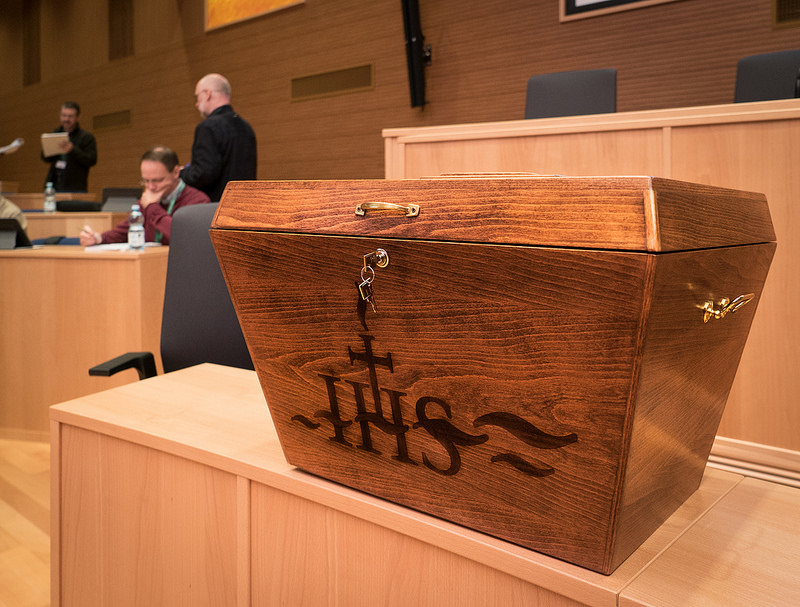
From: www.gc36.org
Why a Latin-American Father General?
It is not a coincidence that the Jesuits elect a General from Latin-America in a parallel time to the one of the pope being from this region of the world, which is the one with most percentage of Catholics per-capita, reaching an average of 60% in Argentina, Bolivia, Brazil, Colombia, Ecuador, Costa Rica, Mexico, Panama, Paraguay, Peru, Dominican Republic and Venezuela, and more than half of the population of Chile, El Salvador, Granada, Guatemala, Honduras, Nicaragua and Uruguay.
Latin America accounts for 483 million Catholics, or 41.3% of the total Catholic population of 1.2 billion.
This region is also considered as a good “cradle” for a Catholic leading-position taker, because of the empathy that a “Latino” can establish with Catholics from the Euro zone, especially those from Italy and Spain and Portugal, due to the common Latin heritage, with those of third world and southern regions, due to similarities in socio-economical behaviors and challenges of these regions and their people, and to those of North America due to hemispheric bond, cultural, and economic links inside the “Americas”.
Rafael Luciani, a Dr in Theology and professor at the Andrés Bello university in Caracas and Boston College, and close friend and colleague of Father Arturo Sosa, considers him as the reflection of a mature point reached by the Latin-American Society of Jesus, which was permeated by the post-Vatican II changes under Father Arrupe´s leadership, and are now bearing fruit.
Father Timothy P. Kesicki SJ remarks that, “as someone from the New World, he (Sosa) brings the riches of the Latin American church and knows also the challenges.” In his own words, “well-defined pastoral-theological options capable of responding to the challenges of the present time.”
What makes Father Sosa fit to take on this challenge?
In a short Q&A session with the media present at the gates of the Curia Generalizia in Rome, just after the announcement of Sosa as the new General was made, it was said that the Venezuelan: “…has a lot of experience in the field of faith and justice, but is also a person attentive to the intellectual apostolate of the Society of Jesus because he has been the Rector of an University for ten years, knows very well the initiatives of the Jesuits in Rome, like the Gregoriana (Universita Ponficia), the Istituto Orientale (P.I.O) and the Istituto Biblico (P.I.O); he has a lot of experience!”
Lombardi had also explained in an interview with the Catholic Herald, before the voting process that: “As an elector, I feel a need to have a personal relationship with the person I am thinking about electing… It is not enough that someone said ¨he is good¨ No. We must verify that and know him personally.”
Irish Jesuit, Fr. Gerry Whelan SJ, lecturer at the Gregorian, describes Sosa as “a very decisive man, familiar and comfortable with leadership roles… who is not afraid to get into the middle of complex or fraught situations in order to work for a good outcome… He is a warm and robust extrovert who will make a fine leader.”
Father Damian Howard SJ, a British province elector, reflects on Father Sosa´s reaction to his new position “Most men would be rather intimidated by being appointed General… But he seems to be taking it in his stride; which is one of the reasons so many of us felt able to place this burden on his shoulders.”
Father Luis Ugalde SJ, a Spanish colleague at the Venezuelan Province, and close friend with Father Sosa, defines his friend as “clearly committed to the Second Vatican Council and following Jesus with a faith capable of working for a more just world without barriers of hatred and discrimination… Like the Pope, he isn’t afraid to hug and kiss… He believes in lay people, in the networks, and he’s got a great sense of humor. For the Venezuelan Jesuits, he has always been a reference point.” Ugalde also adds that Sosa “will be a great general who will last.”
In an interview for America Magazine, the president of the Canada and United States Provinces, Father Timothy P. Kesicki SJ, describes Father Sosa as “a man with cross-cultural experience, having studied at the Gregorian University in Rome as well universities in his homeland. Moreover, besides Spanish he is fluent in English and Italian, and he understands French. He can therefore relate and communicate with members of the order from different lands… coming from Venezuela he has direct experience of some of the challenges we face in the United States, and is especially aware of the difficulties migrants from Latin America face.”
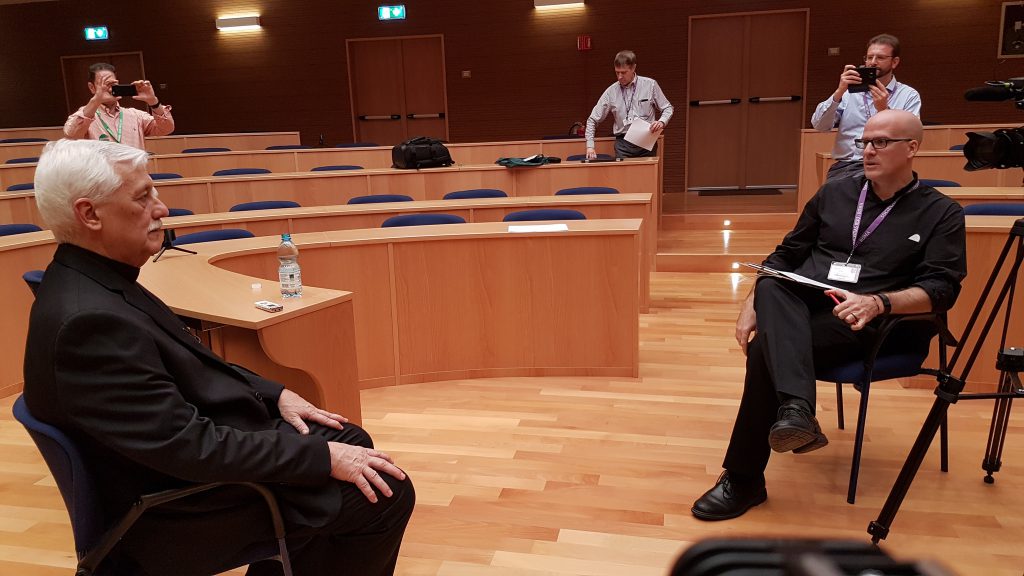
From: www.gc36.org
A Venezuelan Jesuit General: an important news for a country in times of crisis.
Experts consider that by electing a Venezuelan as General, the Society of Jesus is in a tacit way setting a position towards the management that the Venezuelan government is giving to the South-American country, which finds itself living one of the worst social, political, and economic crisis in the history of the western hemisphere, comparable only with the humanitarian crisis lived in Haiti in the beginning of the 21st Century. The role of Arturo Sosa in his various positions in the academic, social work, and political fields, has been that of a critic towards the government and of moral, intellectual and spiritual support to the people in the Caribbean Country. In his own words Sosa describes his relation with Venezuelan reality: “As you have probably seen in my CV, I have dedicated the major part of my intellectual and apostolic activity to comprehending the socio-political process of Venezuela, and the role of the Church in the same.”
Some even consider it comparable to that played by his colleague and friend, Jorge Mario Bergoglio during his pre-Papal role in the Argentina of the 70s, during the dictatorship of Rafael Videla and his relation of criticism with former President Cristina Fernandez. Venezuelan Academic, Rafael Luciani reaffirms this position as he states that “Arturo will play a very important role in this context (In the role of Jesuit General), as he has done in Venezuela.”
In what became his last scale before being summoned to Rome in August 2014, Father Sosa, led a conservatory on the topic of Venezuela´s socio-political situation, at the Centro de Fe y Culturas (Jesuit Center of Faith and Cultures) in Medellin, Colombia, led by his close friend and colleague, Father Horacio Arango SJ (†), in which he made an important critique on the role of the Venezuelan Church facing the situation of polarizing in the Caribbean country: “I feel that Venezuela is a wounded society… The Church is many things, and it is as divided as the country; there are many Catholic Chavists, and many others in the opposition. The hierarchy of the Venezuelan Church has not known how to find its place; it has had a biased position in favor of the opposition, too evident, which made it lose authority, authority that one who puts itself a little bit out of that polarizing logic can have.
In this moment, if there were the need to find a mediation, the Venezuelan Church is not the one to do it… the ecclesial hierarchy of Venezuela has not found neither the language nor the position that from faith, or as a pastor it should take.
Then, what can I do? How can I help in this deliberation?
The Society of Jesus has tried to maintain this position through its publications and courses, trying to maintain an intermediate path, but it is quite hard to keep a position of that nature.”
In an interview that Arturo Peraza SJ, the Venezuelan Provincial gave to Venezuelan TV Channel VALETV, he made it clear why, in his opinion, Father Arturo has what it takes for his new assigned job. “Father Sosa´s social work, along with his intellectual and management capabilities, have led to my fellow Jesuits to consider him as an ideal person to take the lead of the universal Society today.”
He also gave his take on the direct effect that the election of a Venezuelan as Father General has on Venezuela: “Our Father (God) is trying to cheer us up, He is telling us that he is close to us. He (Father Sosa) is not a magical problem solver, God is not turning stones into bread, but The Lord is calling us to realize that we have the strength, the people and the path, because I think Venezuelans should watch ourselves reflected in this type of mirrors, to understand that we have the way of working this out in the middle of difficulties.”
Getting to know him a little better. Some of his thoughts on various topics
Father Arturo Sosa, has been described as a warm, jolly and approachable person, and as having great charisma and sense of humor, but also of being a very sharp, intellectually competent, and of having an acute sense of social empathy and understanding. Here is a glimpse of the personality of this Venezuelan priest, through some of his remarks on some transcendent and other not so serious topics:
On Leadership and Commitment as Citizens:
Remarks made on a video-lecture on Governability and Political Leadership for the Latin-American University Leadership Program, while being Rector of the Tachira University.
- “The citizen of this time requires a global or planetary vision, of the common interests, in which center is posed the possibility of a humanity whit a high quality of life, that ensures the sustainability of the planet in a long term. That is the challenge of today´s leadership.”
- “We have passed from values much more solidary and of sharing our richness and goods, of sharing life in general, to the imposition of that value which is the economic benefit measured in strictly individual terms.”
- “The erosion of cultural diversity leads to the weakening of cultures (of by the way, very ancient cultures) and to the exclusion of big groups of human beings, obliged to abandon their cultures, to insert themselves, marginally, in the dominant scheme.”
- “In the dynamic of a globalized and interdependent world, it turns out deceiving to trust in the convergence of individual decisions; it is necessary to take conscious actions to obtain the aspiration of social justice!”
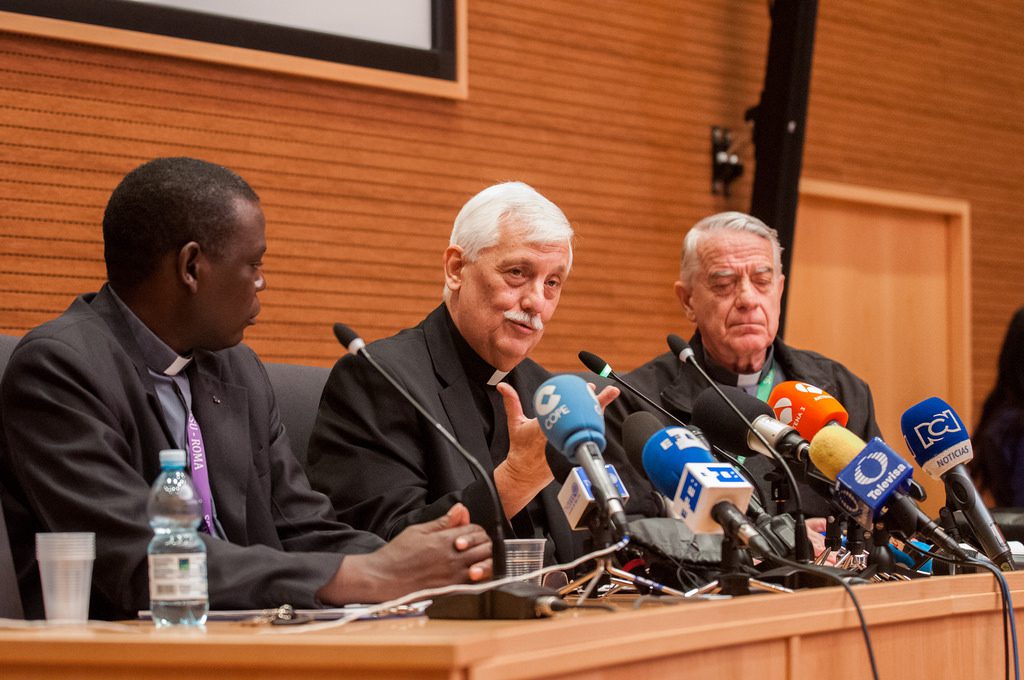
From: www.gc36.org
On his position about being the new “Black Pope”:
Remarks made during his first Press Conference as Superior General.
- “It suits Mulemi better” (teasing with Father Patrick Mulemi, who was sitting aside him, because of the color of his skin. Everybody laughed)
- “I must say that I don´t like the thing of the ´Black Pope´, because as Jesuits we make a vow, a promise not to take or aspire any ecclesial position like bishop or pope. For me the Pope and the Jesuits are like oil and vinegar, that is what salad is made with, oil and vinegar. In the Society of Jesus there are 60 or 70 bishops who are bishops of zones where no one wants to go; I can mention Turkey, for instance, where they just named a Jesuit bishop… Nobody wanted to go… The previous bishop was murdered.”
- “Pope Bergoglio makes a service to the Church as a Jesuit.”
- “The Jesuit Society wants to serve the Church from its vocation, and its vocation is that of service, its vocation is to support what the bishops and the Pope are doing under their pastoral responsibilities.”
On his personal relation with Pope Francis:
Remarks made during his first Press Conference as Superior General.
- “In the same 33rd Congregation in which I met Father Lombardi I also met Father Bergoglio, who was also a delegate. Due to the disposition of the room, we were seated in alphabetical order, so we were in front of each other and saw each other´s faces during the almost two and a half months that lasted the Congregation. And, well, we said ´Hello´, in the group activities, etc. That was my first meeting with Father Bergoglio, who at the time was a Jesuit.
- Then, at some of the trips for working reasons, in the social centers in Argentina, I encountered him, when he was Bishop of Buenos Aires, and then, the next encounter was when he was already Pope, two years ago on September 2014, we had the celebration of a beautiful liturgic afternoon at the Gesù; I had to welcome him, as I was the Delegate for the International Houses, and since then we have met three, four or five times, always under the bond of the International houses with the Pope.”
- “I would like to say that with Pope Francis it is easy to get in communication, and I don´t only mean seeing him, but also to have a cordial communication.”
On his favorite thing about the Society of Jesus:
Remarks made during his first Press Conference as Superior General.
- “What do I like about the Society of Jesus? I could give you a very simple answer: Everything!” What most attracted me since I was young was the Society as an apostolate corps in various scopes.”
SOME FACTS ABOUT ARTURO SOSA SJ:
Place of Birth: Caracas, Venezuela
Date Birth: November 12th 1948
He graduated from the Colegio San Ignacio of Caracas in 1966, which makes him a Jesuit Alumnus, and de facto member of WUJA.
That same year he joined the Society of Jesus.
Life as a Jesuit:
Year of Ordination: 1977
1977-1996: Member of the Venezuelan Province Social Center.
1996-2004: Superior Provincial of Venezuela.
1998-Present: Member of the Provost Council.
1998-2008: Rector of the Catholic University of Tachira
2008-2014: Conciliar General.
2014-2017: Delegate for the International Houses of the Society of Jesus in Rome
October 14th 2017–Present: Superior General of the Society of Jesus
Academic, Editorial and Research:
1972: Undergraduate in Philosophy / Andres Bello University
1978: Theology
1994: PhD in Political Science / Central University of Venezuela
Languages: Speaks Spanish, Italian and English, understands French.
1978 -1979: Professor at the Andres Bello Catholic University of:
History and Political Ideas Seminar
Contemporary Political Theory Course
Social Change in Venezuela Course
The State in the 20th Century Course
1982-1984: Full-time Researcher at the Political Studies Institute of the Central University of Venezuela
1982-1996: Professor at the Central University of Venezuela on:
History of the Political Ideas in Venezuela Course
Political and Legal Science Faculty Graduate Program Seminar
1985-1994: Professor at the Superior School of the Venezuelan Armed Forces on:
Socio-Political Analysis of Venezuela /Command and Mayor State Course
2004: Guest Lecturer at Georgetown University´ Center for Latin-America
2006: Lecturer on Venezuelan Political Thinking at the Catholic University of Tachira
2008-2009: Guided Reading at the Doctorate in Law at the Catholic University of Venezuela and Central University of Joint Program.
Collaboration for publications:
Published articles in various influential Venezuelan magazines, such as:
SIC, Politeia, Political and Legal Science Faculty Magazine, Ignatian Spirituality Magazine, Iter.
1975-1983: Editorialist for El Nacional, Venezuelan newspaper and collaborator for the Cultural Supplement of the Últimas Noticias, newspaper.
Collective writing:
Venezuela Cooperativista (1977)
Venezuela: Análisis y proyecto (1982)
La evolución de las ideas originantes del proyecto político de Acción Democrática 1928-1941 (1984)
Las elecciones de 1983 y el sistema político venezolano (1984)
Realidad Social de Venezuela. (1985)
Evangelizar el Mundo Político venezolano (1985)
Gómez, gomecismo y antigomecismo (1987)
La Formación de la Venezuela Rentista 1899-1957 (1989)
El Sistema Político Venezolano entre 1958 y 1989 (1989)
Prospectiva del Sistema Político Venezolano (1989)
La Política Social de Rómulo Betancourt (1989)
Del garibaldismo estudiantil a la izquierda criolla: los orígenes marxistas del proyecto de A.D. 1958-1935 (1993)
La marcha por la justicia y la paz de Venezuela (1994)
La sociedad civil: del mito a la realidad (1994)
Rómulo Betancourt, la formación de un liderazgo de izquierda nacionalista (1994)
Notes on the Public Dimension of a Humanizing Globalization (2005)
Reflexiones sobre el Poder Comunal (2007)
Publications:
La filosofía política del gomecismo: estudio del pensamiento de Laureano Vallenilla Lanz. (1974)
Democracia y dictadura en la Venezuela del siglo XX (1979). Colonia y Emancipación en Venezuela (1979)
Ensayos sobre el pensamiento político positivista venezolano (1985)
Estudio introductorio y compilación La segunda independencia de Venezuela: compilación de la columna Economía y Finanzas del Diario Ahora 1937-1939 (1992)
El programa nacionalista: izquierda y modernización 1937-1939 (1994). Rómulo Betancourt y el Partido Mínimo: 1935-1937 (1995)
Rómulo Betancourt y el partido del pueblo 1937-1941 (1995)
To learn more about the new Superior General, you can read the article “From Caracas to Rome”, The first interview with Fr. Arturo Sosa, SJ, by the Communication Team of the 36thGeneral Congregation.


